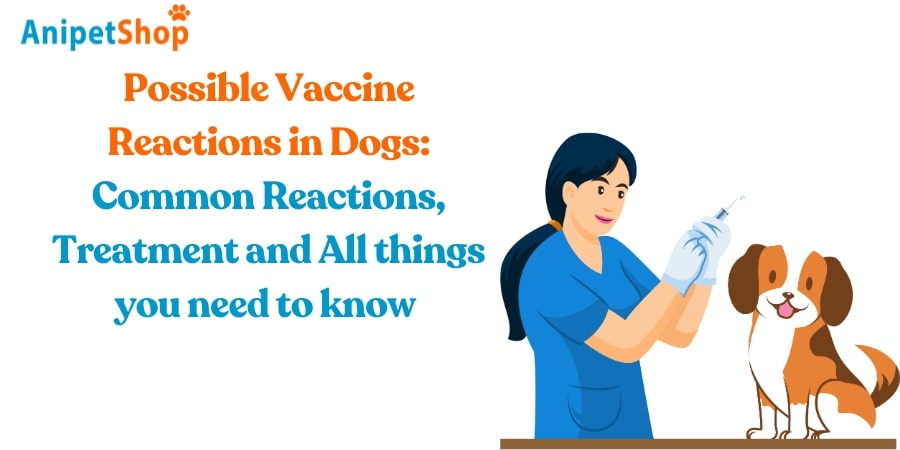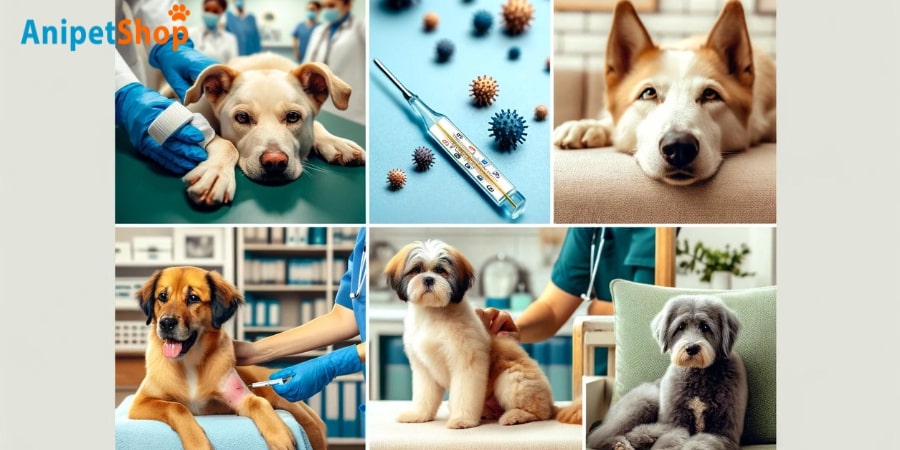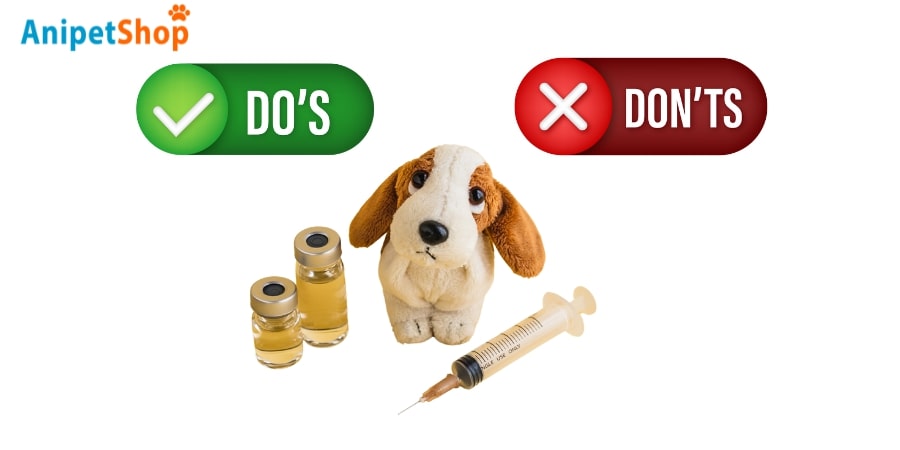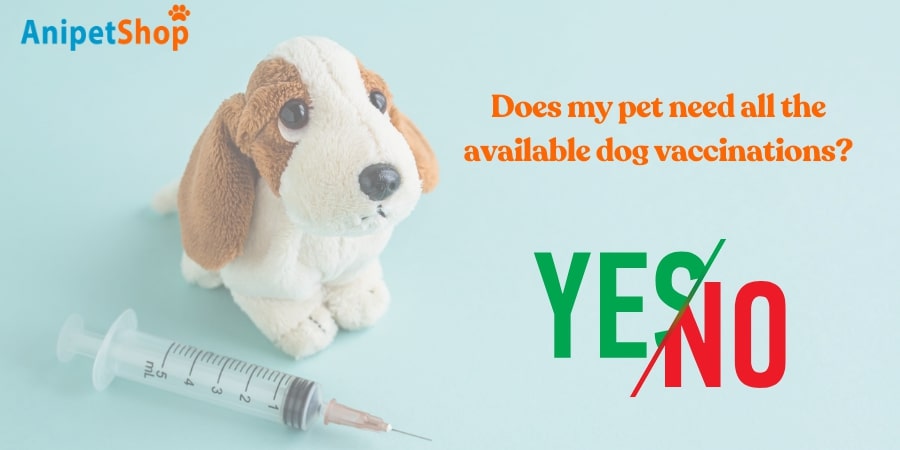Possible Vaccine Reactions in Dogs: Common Reactions, Treatment and All things you need to know
A vaccine reaction in a dog refers to the body’s response to a vaccine. These reactions can range from mild, such as lethargy, mild fever, and soreness at the injection site, to more serious symptoms like facial swelling, vomiting, hives, and breathing difficulties. Mild reactions are common and typically resolve within a few days, while severe reactions, though rare, require immediate veterinary attention. This article will explore these reactions occur as the dog’s immune system responds to the vaccine, building protection against specific diseases.

What are the most common vaccine reactions in dogs?
Ensuring your dog is vaccinated early and regularly provides the best protection against serious and potentially fatal diseases like rabies, hepatitis, and parvovirus. Vaccines help prevent these diseases, which is much better than treating them after they occur. This proactive approach supports a long and healthy life for your pet. Here are some popular vaccine reactions in dogs.
-
Lethargy
Lethargy is a mild, common reaction where the dog appears tired and less active for a day or two. According to the Journal of Veterinary Science, this typically resolves within 48 hours. Monitor your dog, and if lethargy persists, contact a veterinarian.
-
Sneezing & Cold-Like Symptoms
Intranasal vaccines can cause mild symptoms like nasal discharge, coughing, and sneezing, similar to a mild respiratory infection. These usually resolve in a few days. Veterinary Microbiology indicates this is part of the immune response. Consult a vet if symptoms persist.
-
Tenderness or pain at the site of injection
Mild discomfort at the injection site is common, resolving in a few days. A cool compress can help. The Journal of Animal Physiology and Animal Nutrition advises contacting a vet if pain persists to rule out complications.

Treatment of Vaccine Side Effects in Dogs
When a dog experiences side effects from vaccines, prompt and appropriate treatment is essential to ensure their well-being. Here are some steps to treating vaccine side effects in dogs:
- Monitor Closely: Keep a close eye on your dog for any signs of discomfort or adverse reactions following vaccination. Monitor their behavior, appetite, and overall demeanor for at least 24 to 48 hours after vaccination.
- Provide Comfort: If your dog is experiencing mild discomfort, such as soreness at the injection site or lethargy, provide them with a comfortable, quiet space to rest. Offer soft bedding and avoid strenuous activity or rough play that could exacerbate their symptoms.
- Apply Cold Compresses: If your dog has swelling or redness at the injection site, you can apply a cold compress wrapped in a towel to help reduce inflammation and soothe discomfort. Be sure not to apply ice directly to the skin, as this can cause frostbite.
- Encourage Hydration: Make sure that your dog has access to fresh and clean water at all times. Encourage them to drink frequently, as adequate hydration is essential for recovery and can help flush any toxins from their system.
- Offer Gentle Food: If your dog has a decreased appetite following vaccination, offer them small, bland meals that are easy to digest. Boiled chicken and rice or a high-quality commercial dog food formulated for sensitive stomachs can be gentle on the digestive system.
- Contact Your Veterinarian: If your dog experiences more severe or persistent side effects, such as allergic reactions, anaphylaxis, or prolonged lethargy, contact your veterinarian immediately. They can guide appropriate treatment and may recommend bringing your dog in for a thorough examination.
- Follow Veterinary Advice: Follow your veterinarian’s recommendations for treatment closely. They may advise additional medications, such as antihistamines or corticosteroids, to manage allergic reactions or inflammation. In severe cases, your dog may require hospitalization for monitoring and supportive care.
- Adjust Vaccination Protocol: If your dog experiences a severe vaccine reaction, your veterinarian may recommend adjustments to their vaccination protocol in the future. This could include spacing out vaccinations, pre-medicating with antihistamines or corticosteroids, or avoiding certain vaccines altogether if your dog is deemed at high risk for adverse reactions.
The dos and don’ts after your dog’s vaccination
After your dog’s vaccination, it’s important to take certain steps to ensure their health and well-being while avoiding actions that could potentially compromise their immune response or exacerbate vaccine side effects. Here are some dos to follow after your dog’s vaccination:
- Monitor for Side Effects: Keep a close eye on your dog for any signs of vaccine side effects, such as lethargy, swelling at the injection site, or changes in behavior or appetite. Monitor them closely for at least 24 to 48 hours after vaccination.
- Provide Comfort and Rest: Give your dog a comfortable, quiet place to rest and recover after vaccination. Limit strenuous activity and avoid exposing them to stressful or high-risk environments that could compromise their immune system.
- Offer Water and Nutritious Food: Ensure that your dog has access to fresh, clean water at all times to stay hydrated. Offer them nutritious, easily digestible food to support their immune system and aid in recovery.
- Follow Veterinarian Recommendations: Adhere to your veterinarian’s instructions regarding any additional medications or preventive measures recommended after vaccination. Follow-up appointments or booster shots may be necessary to maintain immunity against certain diseases.
- Maintain Good Hygiene: Practice good hygiene around your dog, including regular grooming, cleaning of food and water bowls, and keeping their living environment clean and free from potential sources of contamination.
By contrast, there are some don’ts that pet owners should keep in mind:
- Overexert Your Dog: Avoid engaging in strenuous exercise or activities immediately after vaccination. Give your dog time to rest and recover without putting unnecessary strain on their body.
- Expose Your Dog to Sick Animals: Avoid exposing your dog to other animals that may be sick or contagious, especially in high-traffic areas such as dog parks, grooming facilities, or boarding kennels.
- Administer Additional Vaccines Without Consulting Your Vet: Refrain from administering additional vaccines or medications to your dog without first consulting your veterinarian. Over-vaccination can potentially lead to adverse reactions or compromise your dog’s immune system.
- Ignore Signs of Vaccine Reactions: Don’t ignore any signs of vaccine reactions or adverse effects in your dog. Contact your veterinarian immediately if you notice any concerning symptoms or changes in your dog’s health after vaccination.
- Delay Veterinary Care: If your dog experiences severe or persistent vaccine reactions, such as anaphylaxis or prolonged lethargy, don’t delay seeking veterinary care. Prompt intervention is crucial for ensuring your dog’s health and well-being.

Why should I vaccinate my dog?
Vaccinating your dog is essential for several reasons, all of which contribute to their overall health and well-being:
- Prevention of Disease: Vaccines are designed to stimulate your dog’s immune system to produce protective antibodies against specific infectious diseases. By vaccinating your dog, you can help prevent them from contracting serious and potentially life-threatening illnesses such as rabies, distemper, parvovirus, and canine influenza.
- Protection of Public Health: Some canine diseases, such as rabies, can pose a significant risk to public health as they can be transmitted from animals to humans. Vaccinating your dog against rabies not only protects them but also helps prevent the spread of the disease to other animals and humans.
- Long-Term Cost Savings: While the initial cost of vaccinations may seem like an expense, it’s far less than the cost of treating a dog who has contracted a preventable disease. Veterinary treatment for illnesses such as parvovirus or distemper can be expensive and may not always guarantee a positive outcome. Vaccinating your dog is a cost-effective way to help keep them healthy and avoid costly medical bills in the future.
- Community Immunity: Vaccinating your dog contributes to the concept of “herd immunity” or “community immunity.” When a significant portion of the dog population is vaccinated against a particular disease, it helps reduce the overall prevalence of the disease within the community, protecting even those dogs who may not be able to be vaccinated due to health reasons.
- Legal Requirements: In many regions, certain vaccinations, such as rabies, are required by law. Failure to vaccinate your dog against these diseases may result in legal consequences, including fines or penalties. Additionally, proof of vaccination is often necessary for activities such as travel, boarding, or participation in dog sports or events.
- Peace of Mind: Knowing that your dog is vaccinated provides peace of mind, knowing that you’re doing everything you can to protect their health and ensure a long and happy life together.
Does my pet need all the available dog vaccinations?
While some vaccines are considered core and are recommended for all dogs, others are considered non-core and may be optional depending on your dog’s specific circumstances. Here are some factors to consider when determining your pet’s vaccination needs:
- Core Vaccines: Core vaccines are those that are recommended for all dogs regardless of their lifestyle or environment because they protect against diseases that are widespread, highly contagious, and potentially severe or life-threatening. Examples of core vaccines for dogs include rabies, distemper, parvovirus, and adenovirus (canine hepatitis). These vaccines are typically required by law in many regions.
- Lifestyle and Risk Factors: Your dog’s lifestyle and individual risk factors play a significant role in determining which non-core vaccines they may need. For example, if your dog spends a lot of time outdoors or in areas where ticks are prevalent, vaccines against Lyme disease and leptospirosis may be recommended. Similarly, if your dog will be boarding or attending doggy daycare, vaccines against Bordetella (kennel cough) may be necessary.
- Geographic Location: The prevalence of certain diseases can vary depending on your geographic location. For example, heartworm disease is more common in areas with a higher mosquito population, while Lyme disease is more prevalent in regions where ticks are abundant. Your veterinarian can provide guidance on which vaccines are recommended based on the diseases prevalent in your area.
- Health Status: Your dog’s overall health status and any underlying medical conditions may influence their ability to receive certain vaccines. For example, if your dog has a compromised immune system or a history of vaccine reactions, your veterinarian may recommend a modified vaccination schedule or omit certain vaccines altogether.
- Individualized Vaccination Plan: Work closely with your veterinarian to develop an individualized vaccination plan tailored to your pet’s specific needs. Your vet will take into account factors such as your pet’s age, medical history, lifestyle, and risk factors to determine which vaccines are necessary and appropriate.

Can I prevent my dog from having a reaction to a vaccine?
Unfortunately, you can’t completely prevent a vaccine reaction in your dog, but your veterinarian can discuss ways to minimize the risk. One of the reasons is that some vaccine reactions are uncommon. Most dogs tolerate vaccines well, with some experiencing mild side effects like soreness or fatigue. It could take you an excessive amount of time to control your dogs’ reactions if you are inexperienced. This could lead to some negative consequences such as paralyzing and death if you don’t manage on time. Therefore, it’s important to discuss your dog’s health history with your vet before any vaccinations to determine the best course of action.
Should I have my dog revaccinated?
The decision to revaccinate your dog should be made in consultation with your veterinarian, taking into account your dog’s individual circumstances and vaccination history. Your vet can provide personalized recommendations based on your dog’s age, health status, lifestyle, and risk factors to ensure they receive the necessary protection against preventable diseases while minimizing the risk of adverse reactions or over-vaccination. By working closely with your vet and following their recommendations, you can help ensure that your dog receives the appropriate protection against infectious diseases while maintaining their overall health and well-being.
Lily Watson is an author specializing in veterinary care in Australia. With a profound passion for animal welfare and a solid foundation in veterinary science, Lily has dedicated herself to disseminating valuable knowledge and information for both pet owners and professionals in this field.

